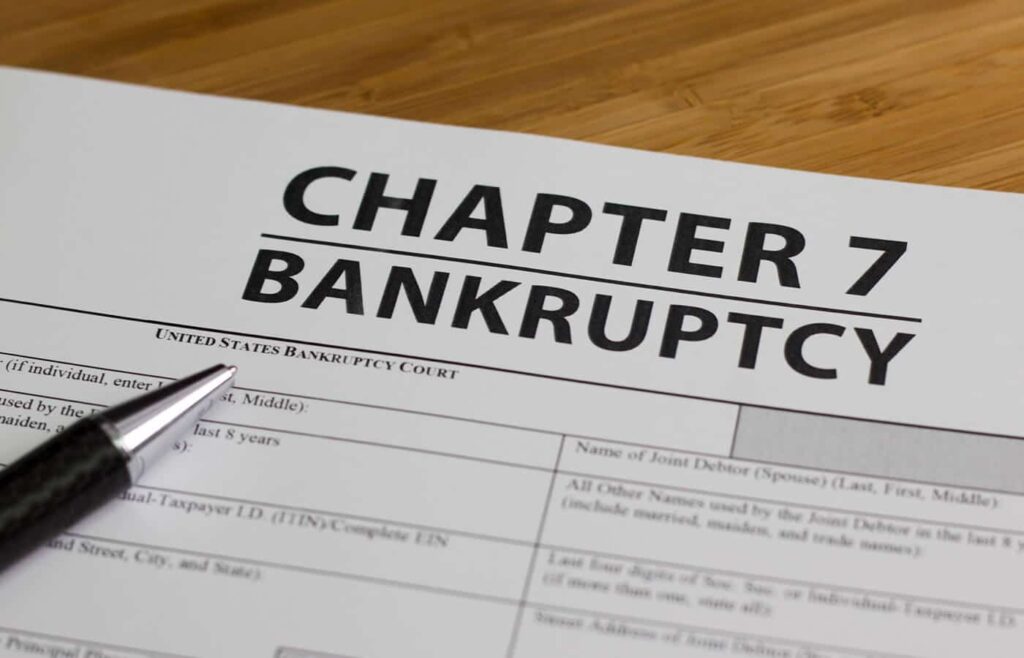If you are considering filing for Chapter 7 bankruptcy, you are probably filled with questions and concerns during this trying time. For example, how do you file Chapter 7 when you don’t have any money? Are you able to afford to hire a bankruptcy attorney? Will you be able to repay your debts, as well as legal and court costs? The good news is that you can file for Chapter 7 bankruptcy even if you don’t have any money.
How to Pay Legal Fees When Filing for Chapter 7 with No Money
If you are not eligible for legal aid but require the assistance of a bankruptcy lawyer, there are certain things you can do to cover the attorney’s fees. Most bankruptcy attorneys understand that paying costs in a lump amount can be difficult, therefore they provide payment options to their clients. When they say you have to pay the attorneys fees “up front,” they usually imply “before your bankruptcy case is filed,” not that you have to come up with a lump sum payment in any way.
Your best bet is to contact a bankruptcy lawyer and request a free appointment to discuss their ideas on how to pay them.

What Is the Cost of Chapter 7 Bankruptcy?
There are numerous sorts of bankruptcy. Almost all personal bankruptcies are classified as either Chapter 7 or Chapter 13. The most prevalent sort of bankruptcy is Chapter 7.
Assuming you’ve decided to file for Chapter 7, these are the fees you’ll have to pay:
- Filing fees
- Fees for Credit and Debt Counseling
- Legal Services Fees
The bankruptcy court system sets filing fees, which are the same across the country. Counseling and legal fees are subject to change.
#1. Filing Charges
These are the costs associated with filing for Chapter 7.
- A case filing fee of $245
- The miscellaneous administrative cost of $75
- A $15 trustee fee
If you don’t incur any more fees, that brings your total to $335.
#2. Counseling Costs
Before the court will discharge your bankruptcy, you must complete two counseling courses. These courses are required for all personal bankruptcies.
- Credit counseling training
- Debtor education program
You must first complete the credit counseling course before filing for Chapter 7. This course will go over the dangers of filing for Chapter 7 bankruptcy and help you decide whether it is the best option for you. The course is approximately $50.
After filing, you take the debtor education course. This course will provide you with the financial management tools you need to get back on your feet once the dust has settled. The debtor education course will cost you roughly $50 as well.
#3. Legal Expenses
Legal fees are determined by a variety of criteria, including the intricacy of your case and the going market rate in your area. A case in New York City will be more expensive than one in Fargo.
If you clearly meet the means test for Chapter 7, have no non-exempt assets, and cooperate with your creditors, your fees will be at the lower end of this range. If you must verify your eligibility, have non-exempt assets, and your creditors fight your bankruptcy, your legal fees will be significantly greater.
Your attorney’s expenses will most likely range between $1,000 and $3,500.
How to File Chapter 7 if you don’t have any money and aren’t eligible for a filing fee waiver
If your household income exceeds 150 percent of the federal poverty level, you may still easily pass the means test and qualify for Chapter 7 debt relief, but you will not be eligible for a bankruptcy court filing fee waiver.
If you have a garnishment, it may be difficult to come up with $338 all at once. In that scenario, you can request a payment plan from the court to cover the court filing fee. Along with your bankruptcy petition and down payment (typically around $80, but this varies by court), you submit the payment plan application. The automatic stay will take effect, and the wage garnishment will be halted. This will then offer you the opportunity to pay the remaining court filing cost so that your bankruptcy case can proceed.
Steps To On How To Prepare File Chapter 7 Yourself When You Don’t Have Money
If you want to save money, the obvious option is to file your bankruptcy case on your own. There is no law that requires you to engage an attorney. However, in this case, following the “DIY” approach may not be the best option. Pro se bankruptcies are rarely successful, and there are numerous ways to go wrong when filing for bankruptcy. Filing for bankruptcy can be a difficult procedure that includes measures such as:
#1. Choosing your chapter.
Examine each chapter of consumer bankruptcy to determine which one to file. Is Chapter 7 or Chapter 13 better for your situation? You must ensure that you meet the means test requirements for the chapter you chose, or your case may be dismissed.
#2. Discovering your state’s exemptions.
Exemptions in bankruptcy rules allow you to keep some of your possessions. These exemptions differ by state, so research yours. It is critical that you understand exactly what can be exempted in order to avoid liquidating something that you could have legally maintained.
#3. Assembling all necessary documentation
This contains both the court records and personal information, such as pay stubs, bills, and descriptions of all your possessions. If you don’t have everything, the court may reject your paperwork or dismiss your case if you don’t finish your submission.
#4. Attending the Creditors’ Meeting
Your creditors may question you about how you intend to repay them at a Meeting of the Creditors. This conference might become uncomfortable if a creditor rejects your repayment plan or contests a discharge because they believe it is unfair or does not fully reimburse them. Furthermore, if your bankruptcy trustee believes your plan is insufficient or discovers errors in your documentation, they might suggest that the judge dismiss your case.
#5. Make any additional court appearances.
Hiring an attorney ensures you will only have to appear in court once, for your Meeting of Creditors. Following that, your attorney will handle any further court appearances. However, if you are representing yourself, you must make arrangements with your employer, school, or home to attend every court session.
You may discover that researching state laws, filing papers, and attending court take too much time away from your job and family. Consider hiring a personal bankruptcy lawyer if you are unable to put in the effort and want to ensure that your case goes well.
How To File For Chapter 7 With No Money
A Chapter 7 bankruptcy might easily cost thousands of dollars. That’s a lot of money for someone who needs to file for bankruptcy. Let’s have a look at various approaches to reduce that sum.
#1. The Fees for Filing
If you need to file Chapter 7 but don’t have any money, there are two options for dealing with filing fees. You can request that the filing fees be paid in installments or that they be eliminated entirely.
a. Installments
You can request permission from the court to pay the filing fee in installments. You must file Form 103A, “Application for Individuals to Pay the Filing Fees in Installments,” propose a payment schedule and specify the number of installments.
- Your installment plan must meet two requirements.
- You are not permitted to suggest more than four installments.
- You must pay your fees in full within 120 days of filing.
If your payment plan fits those requirements, your chances of acceptance are good.
b. Fees Are Waived
You might also request that the court waive the charge entirely. There are a few requirements for you to be eligible for a fee waiver:
- You must demonstrate that you are unable to pay even in installments.
- Your income cannot exceed 150 percent of the poverty line.
To get your fees waived, fill out Form 103B “Application to Have the Chapter 7 Filing Fee Waived.”
You may be summoned to court, where the judge will interview you about your financial status.
#2. Counseling Costs
If your income is less than 150 percent of the poverty line, the expenses for both courses are waived.
The provider of your courses may charge you a lower fee, particularly if they can demonstrate that you can afford it based on the financial information you have provided.
#3. Legal Expenses
This is the most expensive aspect of bankruptcy, and it’s where things become complicated if you need to file Chapter 7 with no money.
You will owe your lawyers money if you do not pay their costs. This is a sort of unsecured debt, which Chapter 7 bankruptcy is most likely to discharge. In other words, once your bankruptcy is discharged, you will not be required to pay any money to your attorneys.
Bankruptcy lawyers are well aware of this, which is why you must pay your attorney in full before your case is filed.
What to Avoid When You Don’t Money
If you have no money and need to file Chapter 7, the suggestions above may assist you in paying your lawyer. There are a few things you should avoid doing as well.
Keep clear from:
#1. Taking on Additional Debt
You may be thinking to yourself, “If my debt is going to be forgiven anyway, why not pay my lawyer using my credit card?”
That is not something you want to do. For one reason, any obligation incurred 90 days before filing may not be discharged. Any debt you incur with the express goal of including it in your bankruptcy will not be discharged.
#2. Getting Rid of Your Exempt Assets
Some of your assets will be shielded from the bankruptcy process. Your home equity or retirement account may be among these assets.
If you decide to sell part of these assets to pay for your bankruptcy, you may face early withdrawal penalties or large tax costs. If you rely on home equity loans, you may lose your home if you fail to make the payments later.
Summary
If bankruptcy is your last option, there are ways to avoid expenses and file for Chapter 7 with no money.
Chapter 7 bankruptcy is intended to remove debt and provide you with a fresh start as quickly as possible. You may have to sell any nonexempt assets to pay off as much debt as possible, but in 90 percent of all consumer bankruptcy cases, filers preserve their homes. To address the debt, Chapter 13 demands a payment plan. Filers can keep their home and other valuable assets since debt is addressed gradually.
Only in Chapter 7 can you request a cost waiver.
Though you have the option of filing Chapter 7 on your own, there are alternatives to resolving debt before filing bankruptcy. A nonprofit credit counseling organization could discuss debt management solutions that could alleviate the financial burden. Examining those alternatives before declaring bankruptcy may help you avoid the major negative impact bankruptcy has on your credit score.



